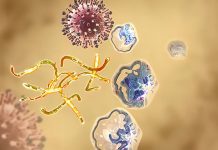
A first-of-its-kind study from researchers at UC Davis School of Medicine found that probiotics significantly improve symptoms of constipation, vomiting, and nausea in pregnancy. The findings are published in the journal, Nutrients.
Nausea and vomiting affect about 85% of pregnancies and can significantly impact the quality of life, particularly during early pregnancy. “The cause of vomiting and nausea in pregnancy is unknown to this date. Various theories have been proposed, but none of them is conclusive,” said Albert T. Liu, lead author for the study and a professor of obstetrics and gynaecology.
“Nausea, vomiting and constipation during pregnancy can significantly diminish the quality of patients’ lives. Once nausea and vomiting during pregnancy progress, they can become difficult to control, and sometimes the patient even needs to be hospitalised,” Liu said.
Beneficial bacterial for nausea in pregnancy
Probiotics supplements contain “beneficial bacteria”, however foods like yoghurt and tempeh also have probiotics. According to the National Center for Complementary and Integrative Health, other than vitamins, probiotics or prebiotics were the third most used dietary supplement for adults.
Probiotics support the community of different microbes, often referred to as the “gut microbiome”, found in the gastrointestinal tract.
Hormones like estrogen and progesterone increase and cause many physical changes such as vomiting and nausea in pregnancy. The researchers aimed to uncover whether supplementing with a probiotic is beneficial for gastrointestinal function during pregnancy.
A total of 32 participants took a probiotic capsule twice a day for six days and then took two days off. They repeated this cycle for 16 days.
The probiotics were available over the counter and mainly contained Lactobacillus., a type of good bacteria. Each capsule contains approximately 10 billion live cultures at the time of manufacture.
Contributors kept 17 daily observations of their symptoms during the duration of the study, for a total of 535 observations for the researchers to statistically assess.
The researchers found that taking the probiotic significantly reduced vomiting and nausea in pregnancy. Hours of feeling nauseous reduced by 16% and vomiting reduced by 33%. Probiotic intake improved symptoms related to the quality of life, such as fatigue, poor appetite and difficulty maintaining normal social activities. Furthermore, constipation symptoms were reduced significantly.
“Over the years, I’ve observed that probiotics can reduce nausea and vomiting and ease constipation. It’s very encouraging that the study proved this to be true,” said Liu. “Probiotics have also benefited many of my other patients who weren’t in the study.”
The impact of gut microbes
To further solidify their findings, the researchers asked participants to contribute faecal specimens before and during the study. The samples were analysed to identify the type and number of microbes and the different by-products of digestion.
This allowed researchers to examine whether biomarkers in the faecal specimens corresponded with more severe nausea in pregnancy and assess how the probiotics affected participants who began the study with different baseline biomarkers.
The research found that a low number of bacteria that carries an enzyme named bile salt hydrolase was associated with pregnancy-related vomiting. Probiotics increased bile salt hydrolase-producing bacteria, which explains why levels of vomiting and nausea in pregnancy decreased.
Furthermore, high levels of gut microbes Akkermansia and A. muciniphila were associated with more vomiting. The probiotic significantly reduced the amount of those microbes. This suggested that Akkermansia and A. muciniphila may be reliable biomarkers that predict sickness in pregnancy.
High levels of vitamin E were found after taking probiotics which reduces sickness.
“This research provides key insights about the impact of gut microbes on gastrointestinal function during pregnancy. Our gut microbiota explains why we are what we eat, and why bacteria-generated metabolites and products have a huge impact on our health,” said Wan. “They affect the gastrointestinal tract as well as skin health and neurological function.”
Although the findings are intriguing, the researchers caution that due to the small sample size, further studies will be needed to confirm the effects of the probiotics.
“Our previous work showed the benefits of probiotics in preventing liver inflammation. The current study might be one of the first to show the benefits of probiotics in pregnancy,” said Wan. “It would be interesting and important to test whether probiotics can reduce nausea and vomiting caused by chemotherapy in cancer patients.”
























